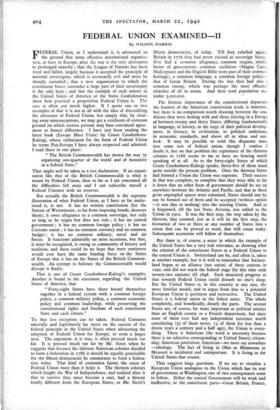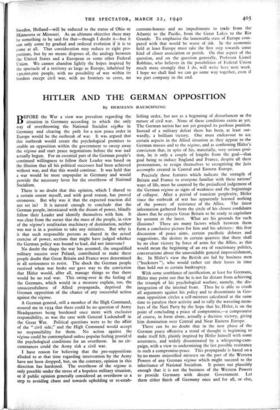FEDERAL UNION EXAMINED II
By WILSON HARRIS
FEDERAL Union, as I understand it, is advocated on the ground that some effective international organisa- tion, at least in Europe, after the war is the only alternative to prolonged anarchy ; that the League of Nations has been tried and failed, largely because it accepted the principle of national sovereignty, which is necessarily evil and must be sharply curtailed ; that a new organisation to which the constituent States surrender a large part of their sovereignty is the only hope ; and that the example of such unions as the United States of America or the Swiss Confederation show how practical a proposition Federal Union is. The case is often put much higher. If I quote one or two examples of that it is not at all with the idea of discrediting the advocates of Federal Union, but simply that, by clear- ing away misconceptions, we may get a residuum of common ground on which serious persons may base convinced agree- ment or honest difference. I have just been reading the latest book (Europe Must Unite) by Count Coudenhove- Kalergi, whose enthusiasm for the form of Federal Union he terms Pan-Europa I have always respected and admired. I read there in one place: " The British Commonwealth has shown the way by organising one-quarter of the world and of humanity in a federal State."
That might well be taken as a test declaration. If an organi- sation like that of the British Commonwealth is what is meant by Federal Union, then so far as I am concerned all the difficulties fall away and I can subscribe myself a Federal Unionist with no reserves.
But actually the British Commonwealth is the supreme illustration of what Federal Union, as I have so far under- stood it, is not. It has no written constitution (for the Statute of Westminster, so far from imposing bonds, destroys them); it owes allegiance to a common sovereign, but only so long as he reigns but does not rule ; it has no central government ; it has no common foreign policy ; it has no Customs union ; it has no common currency and no common budget ; it has no common military, naval and air forces. It functions admirably on most occasions, but that, it must be recognised, is owing to community of history and tradition, and there could be no hope that mere sentiment would ever have the same binding force on the States of Europe that it has on the States of the British Common- wealth. An attempt to federate the Commonwealth would disrupt it finally.
That is one of Count Coudenhove-Kalergi's examples. Another is found in the statement, regarding the United States of America, that " Forty-eight States have there bound themselves together in a federal system with a common foreign policy, a common military policy, a common economic policy and common leadership, while preserving the constitutional rights and freedom of each constituent State and each citizen."
To that less exception can be taken. Federal Unionists naturally and legitimately lay stress on the success of the federal principle in the United States when advocating the adoption of Federal Union for Europe, or even a larger area. The argument, it is true, is often pressed much too far. It is pressed much too far by Mr. Streit when he suggests that because the thirteen American colonies decided to form a federation in 1788 it should be equally practicable for the fifteen democracies he enumerates to form a federa- tion today. That kind of contention harms the cause of Federal Union more than it helps it. The thirteen colonies which fought the War of Independence, and realised after it that to survive they must become a unit, had a history totally different from the European States, or Mr. Streit's fifteen democracies, of today. Till they rebelled agaiii,; Britain in 1776 they had never existed as sovereign States they had a common allegiance, common origins, similar forms of government, common traditions (Magna Carta, Shakespeare and the English Bible were part of their common heritage), a common language, a common foreign policy— that of Great Britain. During the war they had also common enemy, which was perhaps the most effective stimulus of all to union. And their total population wa, under 3,000,000.
The historic importance of the constitutional departure the framers of the American constitution made is immense, but there is no comparison worth drawing between the con- ditions they were dealing with and those existing in a Europe of between twenty and thirty States, differing fundamentally in language, in history, in the stage of their political develop- ment, in literacy, in civilisation, in political ambitions, in economic standards, and above all in ideas and out- look. It may be possible to weld this disparate mass into some sort of federal union, though I confess I doubt it, but on that problem the experience of the thirteen colonies in 1788 seems to me to have no bearing worth speaking of at all. As to the forty-eight States of which Count Coudenhove-Kalergi speaks, thirty-five of them stand quite outside the present problem. Once the thirteen States had formed a Union the Union was supreme. Their success in that was complete, so complete that they were able to lay it down that no other form of government should be set up anywhere between the Atlantic and Pacific, and that as those great unpeopled spaces were colonised, States should one by one be formed out of them and be accepted (without option —it was that or nothing) into the existing Union. And so it happened, till the last State, Arizona, was added to the Union in 1912. It was the first step, the step taken by the thirteen, that counted, just as it will be the first step, the formation of two or three or any number of States into a union that can be proved to work, that will count today. Subsequent accessions will follow of themselves.
But there is, of course, a sense in which the example of the United States has a very real relevance, as showing what the relation of the constituent States in a Federal Union to the central Union is. Switzerland can be, and often is, taken as another example, but it is well to remember that Switzer- land began as an alliance (not union) of three cantons in 1291, and did not reach the federal stage (by this time with twenty-two cantons) till 1848. Such measured progress as that towards Federal Union could disturb no one's sleep. But the United States is, in this country at any rate, the more familiar model, and to argue from that to a potential European Union is pertinent and instructive. The United States is a federal union in the fullest sense. The whole completely, and beneficially, dwarfs the parts. The several States are, of course, far more important as political entities than an English county or a French department, but since none of them ever had any independent existence worth considering (35 of them never, 13 of them for less than a dozen years a century and a half ago), the Union is every- thing. There is American (the word is necessary because there is no adjective corresponding to United States) citizen- ship, American patriotism, American—we must say nowadays —ideology. The fact of living in Ohio or Minnesota or Missouri is incidental and unimportant. It is living in the United States that counts.
That suggests large questions. If we are to visualise a European Union analogous to the Union which has its seat of government at Washington, one of two consequences seem to follow. Either the central Government will be weak and ineffective, or the constituent parts—Great Britain, France, Sweden, Holland—will be reduced to the status of Ohio or Minnesota or Missouri. As an ultimate objective there may be something to be said for that—though I doubt it—but it can only come by gradual and ordered evolution if it is to come at all. That consideration may reduce to right pro- portions, but by no means disposes of, the analogy between the United States and a European or some other Federal Union. We cannot abandon lightly the hcipes inspired by the spectacle of a territory as large as Europe, inhabited by 130,000,000 people, with no possibility of war within its borders except civil war, with no frontiers to cross, no customs-houses and no impediments to trade from the Atlantic to the Pacific, from the Great Lakes to the Rio Grande. To emphasise the lamentable state of Europe com- pared with that would be waste of ink. In the economic field at least Europe must take the first step towards some kind of closer association or perish. On that aspect of the question, and on the question generally, Professor Lionel Robbins, who believes in the possibilities of Federal Union much more strongly that I do, will write here next week. I hope we shall find we can go some way together, even if we part company in the end.







































 Previous page
Previous page